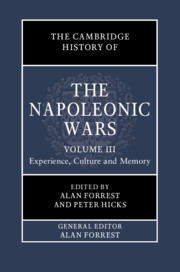Book contents
- The Cambridge History of the Napoleonic Wars
- The Cambridge History of the Napoleonic Wars
- The Cambridge History of the Napoleonic Wars
- Copyright page
- Contents
- Figures
- Maps
- Contributors to Volume III
- Introduction to Volume III
- Part I The Experience of War
- Part II The Experience of Imperial Rule
- Part III War, Culture and Memory
- 12 Memoirs and the Communication of Memory
- 13 Festivals, Ceremonies and Public Commemorations
- 14 The Portrayal of Heroism
- 15 The Fine Arts and the Napoleonic Wars
- 16 Poets and Novelists: Writing the Memory of War
- 17 Political Keyboard Music in Revolutionary and Napoleonic France: ‘The Battle’
- 18 The Napoleonic Wars in Caricature
- 19 The Napoleonic Wars in European Cinema
- 20 Nostalgia, or a Ruin with a View
- Part IV The Aftermath and Legacy of the Wars
- Bibliographic Essays
- Index
12 - Memoirs and the Communication of Memory
from Part III - War, Culture and Memory
Published online by Cambridge University Press: 05 August 2022
- The Cambridge History of the Napoleonic Wars
- The Cambridge History of the Napoleonic Wars
- The Cambridge History of the Napoleonic Wars
- Copyright page
- Contents
- Figures
- Maps
- Contributors to Volume III
- Introduction to Volume III
- Part I The Experience of War
- Part II The Experience of Imperial Rule
- Part III War, Culture and Memory
- 12 Memoirs and the Communication of Memory
- 13 Festivals, Ceremonies and Public Commemorations
- 14 The Portrayal of Heroism
- 15 The Fine Arts and the Napoleonic Wars
- 16 Poets and Novelists: Writing the Memory of War
- 17 Political Keyboard Music in Revolutionary and Napoleonic France: ‘The Battle’
- 18 The Napoleonic Wars in Caricature
- 19 The Napoleonic Wars in European Cinema
- 20 Nostalgia, or a Ruin with a View
- Part IV The Aftermath and Legacy of the Wars
- Bibliographic Essays
- Index
Summary
On the afternoon of 18 June 1815, François-René, vicomte de Chateaubriand, was walking on the outskirts of Ghent, where he had accompanied Louis XVIII into exile, reading, if we are to believe him, a copy of Caesar’s Commentaries, when he heard a ‘dull rumbling’. He stopped and listened, looked up at the cloudy sky, but heard nothing more so continued on his way. Thirty paces later, the rumbling began again, ‘now short, now drawn out at irregular intervals’. He crossed the road and leant against the trunk of the poplar tree, with his face turned in the direction of Brussels:
A southerly wind sprang up and brought me more distinctly the sound of artillery. That great battle, nameless as yet, whose echoes I was listening to at the foot of a poplar, and for whose unknown obsequies a village clock had just struck, was the Battle of Waterloo!1
- Type
- Chapter
- Information
- The Cambridge History of the Napoleonic Wars , pp. 241 - 259Publisher: Cambridge University PressPrint publication year: 2022

